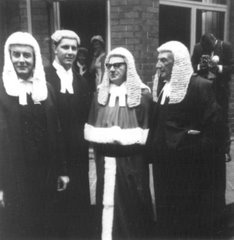I love Matt and Akshay's lists and felt compelled to add one of my own. If The Confessions of Nat Turner and The Hunchback of Notre Dame hadn't been mentioned I would definitely have included them on mine.
6. Charles Dickens, A Tale of Two Cities – I forget if this is Dickens’ only or one of his two historical novels. It’s wonderfully inaccurate (was it Orwell who complained that Dickens was responsible for making everyone associate carriages with death?), more a pastiche with the French terror as a backdrop, and terribly entertaining. I read it again a few years ago after slogging through it in high school and managed to tear through it in a day. Damn you, Madame Defarge!
5. Isaac Bashevis Singer, The Manor and The Estate – It’s the history of a rich Jewish family in Poland from 1862 until the end of the 19th century, plotted like an 800 page train wreck, with one disaster befalling the tragically imperfect Calman Jacoby and his daughters after the other. From Singer’s introduction: “All the spiritual and intellectual ideas that triumphed in the modern era had their roots in the world of that time – socialism and nationalism, Zionism and assimilationism, nihilism and anarchism, suffragettism, atheism, the weakening of the family bond, free love, and even the beginnings of Fascism.” There’s also a paragraph in the text dedicated to vegetarianism. I don’t think a similar novel of our own time concentrating on “post-modernism and Christian fundamentalism, anti-Islamo-fascism and Obama-fascination,” would carry as great a weight.
4. Philip Roth, American Pastoral – The best American novel of the last 30 or so years may not count as historical, as Roth lived through all the events he describes. But there’s a strangeness with which he recreates the optimism of post-war Newark in the 40s and 50s and then the horrors of the 60s. John complained in a comment on a previous list that he disliked soundtracks that lazily presented the 60s as a wild and crazy time. American Pastoral is the only work of art that has convinced me that it was.
3, Primo Levi, If Not Now, When? – Levi did a great deal of research to imagine an alternative life during World War II, not as a Holocaust detainee, but as a partisan fighter whose suffering seemed to have more meaning and purpose. The Jew who expresses his sympathy for Dresden’s victims felt like a liberal transplant from 1982, when the novel was written, but I was willing to forgive the transgression.
2. Alexander Solzhenitsyn, Cancer Ward – Solzhenitsyn wrote a true historical magnum opus about World War I which I haven’t read, but Cancer Ward brings back a very specific moment during the Khruschev Thaw, when Stalin’s victims were just coming to terms with the hell of their camps, and everyone was looking forward, very uncertainly to a less-than-promising future. I’ve met quite a few Eastern Europeans who have told me that this book actually speaks to their feelings right after 1989.
1. Ivo Andric, The Days of the Consuls, a.k.a. Bosnian Story, a.k.a. Bosnian Chronicle – Andric’s claustrophobic book is about a group of second-rate diplomats stationed in Travnik, Bosnia during the Napoleonic Wars. It touches anyone whose ever been an expatriate stationed in a small country, and who comes from an empire about to be neutered.
Thursday, November 8, 2007
Subscribe to:
Post Comments (Atom)

4 comments:
Has anyone read any Scott? It seems strange for him to be such a prominent figure and then have no one read him anymore. I also have Hermann Broch's "The Death of Virgil" staring down from my bookshelf and was wondering whether it was worth picking up.
I read "Ivanhoe" a few years ago, and it was goofy in all the predictable ways, but I still finished it in about a week. "Waverley," which I tackled for my lone graduate-level English course, is probably a better book. I remember my professor arguing that although Scott is always tagged as the classic clueless romanticist, the way the novel unfolds is actually rather realistic.
Also, one day I'll get to "The Heart of Midlothian", which most critics today (that is, those critics who still read Scott) seem to think is his best book of all.
No Dumas? The Three Musketeers is pretty enduring fare.
I'll also bring in Lampedusa's The Leopard, which I haven't finished, but which was pretty good to start with.
I believe Barnaby Rudge was Dickens's other historical novel, set during the Gordon Riots.
But there is some question as to what constitutes historical fiction. Middlemarch, besides taking place in an imaginary town, takes place in a very particular time - the period of the Great Reform Act - which was about 40 years before Eliot was writing. Stendhal, on the other hand, was writing Charterhouse of Parma around 1830, which is more or less within a decade of when it is set.
I think War and Peace is clearly in some sense historical fiction (certainly much more than Charterhouse). There's lengthy detailed descriptions of historical figures and historical events, in addition to all that obnoxious theorizing about history.
I'd also like to bring in Susanna Clarke's Jonathan Strange and Mr Norrell, which is arguably sort of historical fiction. It's a fantasy novel, but it's set in kind of an alternative Regency England where magic worked and northern England was ruled by a mysterious sorcerer King for several hundred years during the Middle Ages. Otherwise, history proceeds very much as it really did, and the characters encounter Lord Byron and the Duke of Wellington and mad King George III. A greatly enjoyable book, if not quite historical fiction.
Post a Comment